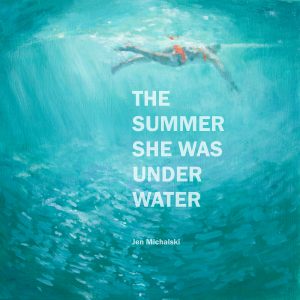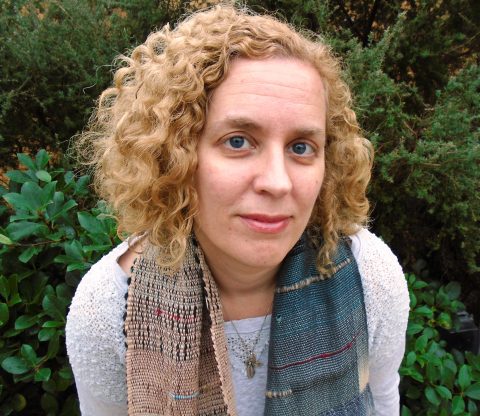Editor’s Note: Jen Michalski will be giving away a copy of The Summer She Was Under Water to the writer whose story she picks for publication. She will be reading all stories submitted October 3-9 2016.
Can you talk us through the process of writing The Summer She Was Under Water? Did you always know it was going to be a novel? What it was like to write about a novelist while writing a novel?
It’s funny; I just had this question last night at a reading, about the conceit of writing about a writer—I know, so original, writing about a writer! When I was working on the first draft of Summer years and years ago, I knew I wanted the protagonist, Sam, to have a profession in which she could have a few months off in order to spend a summer at the family cabin. So I made her a writer, a professor, mainly for that reason. It wasn’t until I came back to the book years later, after I combined it with a surrealistic novella about a pregnant man I’d written in the meantime, that I knew Sam had to be a writer, that it wasn’t just a lazy, convenient plot conceit. She had to have written the surrealistic novella that I’d inserted in the book, because the novella was a metaphor for a dark family secret that comes to light at the cabin, and I knew there was no way Sam could process this event unless she told it to the reader, to herself, in a cloaked, surrealistic way. And I think that’s true of any writer—not only do we write to explore hard truths and probe tender wounds, but we also find incredibly fantastical ways to present them sometimes so that we’re able to explore them at all.
So yeah, Summer was actually two projects I wove together, two completely different pieces with nothing in common except that one, the surrealistic novella, challenged me to write the real terrible truth of the story I’d been circling around in the draft of the other, too scared to explore. It’s funny how your own writing subconsciously tricks you that way.
What advice would you give a writer who’s used to writing short stories, especially stories as short as flash, about writing a novel?
Well, as someone who’s written both, I don’t think they’re really different. Novels are composed of hundreds of flashes, really, and for a while, while I was writing Summer, I also found myself writing a lot of flash stories about a girl named Alex (one of the those stories, “Conjugation,” actually was published by SmokeLong, and became a bit of a scene in Summer). I started thinking that maybe I was sort of writing a novel in these Alex scenes, or even something that could be turned into a novel in stories, although I’ve since put the project aside. But I did just finish a novel in novellas. So I think, at whatever level you’re writing, micro or macro, you have the potential to broaden your scope (a novel that is born from interconnected flash pieces) or tighten the focus (a novel that can be broken down into flash pieces), because the elemental pieces are basically the same.
And I think it’s best to think about writing as parts, little machines that can be formed and make big machines. Like working through a sequence of interconnected pieces, and listen to what they’re saying to you, rather than start off thinking, “I’m going to write a novel this year.” In fact, when I’m writing something, I have no idea whether it’s going to be a short story or a novella or a novel or whether I’ll scrap it all and just keep a small piece of it. Most novels I’ve written began from short stories I found I couldn’t end after ten or twenty pages. I think the story that you want to tell will find the format in which it needs to be told.
As the managing/founding editor of JMWW, what makes you know very quickly that you want to accept a story?
 The first line. Well, it’s not a 100% indicator, but I’m always surprised by how many pieces I read that I’m not drawn in by the first line. And generally, I’ll stop reading after that, because there’s so much else to do. Nowadays, especially with Twitter and the brevity and competition that online media have created in general, you have to make sure your work stands out immediately, whether it’s the words, the imagery, the acoustics. I love reading work that immediately pops out over the static of “generic-literary-short-fiction-submission” (I should add, in a non-gimmicky way). In fact, if you keep me reading past the first few pages, I’d say your chances are being accepted are least fifty-fifty.
The first line. Well, it’s not a 100% indicator, but I’m always surprised by how many pieces I read that I’m not drawn in by the first line. And generally, I’ll stop reading after that, because there’s so much else to do. Nowadays, especially with Twitter and the brevity and competition that online media have created in general, you have to make sure your work stands out immediately, whether it’s the words, the imagery, the acoustics. I love reading work that immediately pops out over the static of “generic-literary-short-fiction-submission” (I should add, in a non-gimmicky way). In fact, if you keep me reading past the first few pages, I’d say your chances are being accepted are least fifty-fifty.
Beyond that, I really want to care what happens to your characters. I want to love them or hate them, or cry about them or worry about them. I want them to have heft, to feel real authentic; I want to almost be able to reach out and touch them. I find that, in a lot of submissions I read, I just don’t care about the characters. And I think the writer has to really care about the people in his or her story for the reader to.
What was the first thing you ever wrote that you made you think, yes, I should keep writing?
I don’t think that was ever a question for me. I’ve written stories and novels since I learned to write. And for most of my life they were horrible and cliché, but they were only for me. Because I was a bit of a loner as a teenager, thinking I might be gay (at least crushing on guys and girls), those characters were my friends, my girlfriends and boyfriends. Those plots were the situations in which I found my life chops, my life skills (and later, my writing skills). Also, being a gay-bi-wondering teen in the late eighties, there weren’t many stories out there that I felt reflected me, my tastes, the way that here are now. So I just wound up writing my own. But writing was, and still is, a way to process the world and my feelings, to engage in situations and people with whom I have no familiarity but want to experience.
I know that even if my work is never published again, I’ll never stop writing. It’s always been something I’ve done for me, and I’ve been extremely lucky and grateful that, at times, other people have wanted to read what I’ve written, too.


 A SmokeLong Summer 24!
A SmokeLong Summer 24!